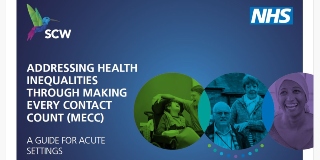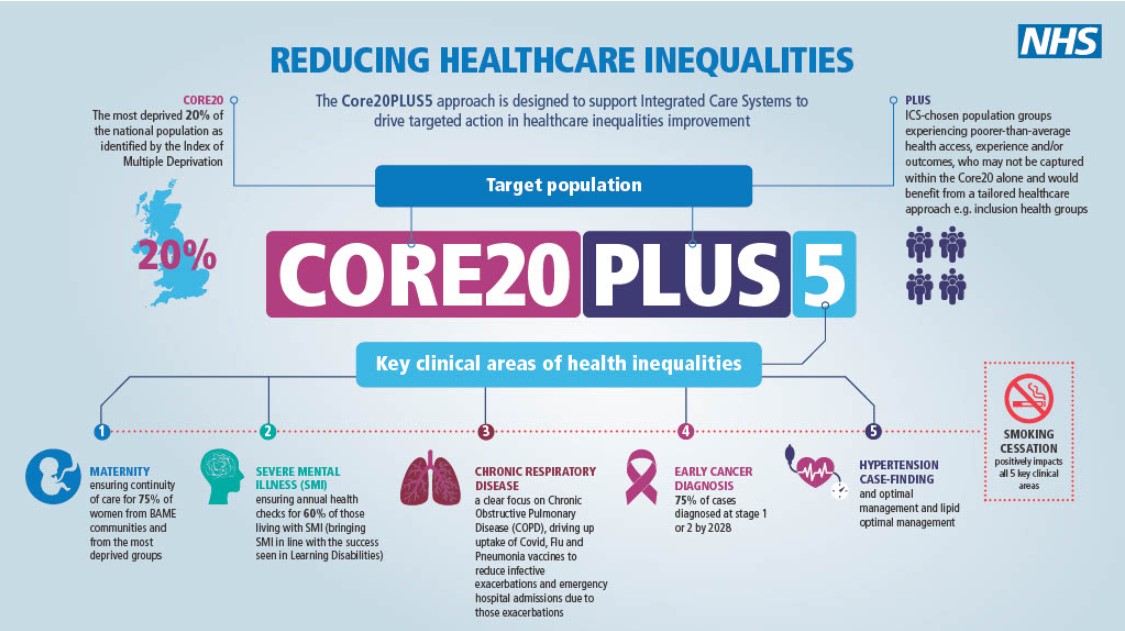
The Making Every Contact Count approach encourages health, social care and Voluntary Community Faith Social Enterprise organisation staff to use the opportunities arising during their interactions with individuals to have conversations about how they might make positive improvements to their health or wellbeing.
Guide to addressing health inequalities through Making Every Contact Count
Addressing health inequalities and their root causes, requires a number of tools and approaches. This guide for acute settings explores the approach of positively influencing behaviour change through everyday interactions, specifically in acute healthcare environments.
The Making Every Contact Count (MECC) approach encourages health, social care and Voluntary Community Faith Social Enterprise organisation (VCFSE) staff to use the opportunities arising during their interactions with individuals to have conversations about how they might make positive improvements to their health or wellbeing.
By effectively using these interactions, we have the opportunity to reduce health inequalities and build healthier and empowered communities.
This guide has been developed to provide acute settings with guidance and support when considering their approach to Making Every Contact Count (MECC), with a specific focus on its application to address health inequalities.

This guide contains practical examples of MECC interventions and tips for success, providing an insight into when, where and how MECC has been used in acute settings.
This supplements existing guidance on MECC. Links to further reading and resources are provided to support the implementation of the approach.
Principles and interventions
The principles of MECC include:
- Using every interaction as an opportunity for a health promoting intervention
- Enabling staff to recognise opportunities to impact people’s health and wellbeing by delivering ‘very brief’ or ‘brief’ evidence-based interventions for lifestyle behavioural change.
- Empowering people to seek out their own solutions to supporting their own health and wellbeing.
MECC interventions focus on the lifestyle issues that, when addressed, can make the greatest improvement to an individual’s health and well-being:
- Stopping smoking
- Drinking alcohol only within the recommended limits
- Healthy eating
- Being physically active
- Being aware of the importance of immunisations and vaccinations
- Improving mental health and wellbeing
Case studies
Summary
MECC was initially piloted in Outpatient Departments (OPD) but is now expanding to other areas of the Trust.
- Over 30,000 offers of support have been made through MECC conversations, with over 5,500 referrals made to external providers.
- The programme has faced challenges, particularly in terms of pressures on clinic time and the need for a tailored approach in different work areas.
- Feedback from staff and patients has been positive.
- Future plans include scaling up to non-OPD areas, increasing the footprint within Allied Health Professional-led services, and continuous monitoring of the MECC offer rate and referral rate.
Further resources
- Guidance published by Public Health England to support people and organisations when considering or reviewing MECC activity and implementing initiatives. Making Every Contact Count (MECC): practice resources
- The Making Every Contact Count E-learning for Health module on provides an interactive resource to support knowledge and understanding of MECC. E-learning for Health - Making Every Contact Count
- NICE behaviour change guidance provides principles and recommendations to encourage individuals to adopt a healthier lifestyle. Behaviour change: general approaches
- The Wessex MECC Implementation Toolkit is designed to provide practical information on the concept of MECC and how it can be implemented in healthcare settings. Wessex MECC Toolkit (PDF)
- The Behaviour Change Development Framework and Toolkit can help you decide what sort of behaviour change training and planning is needed to effectively support people to make positive changes in their lives. Behaviour Change Development Framework and Toolkit
- Guides for national and local government and partners, such as the NHS, emergency services and third sector, to support people to have healthier behaviours. Behaviour change: guides for national and local government and partners
Many regional organisations, NHS Trusts and ICBs have developed their own resources for implementing MECC:
- North East and North Cumbria MECC resources
- Yorkshire and Humber MECC link
- Cheshire and Merseyside MECC Moments
- Leicestershire Having Healthy Conversations
- Midlands and East Learning resources



